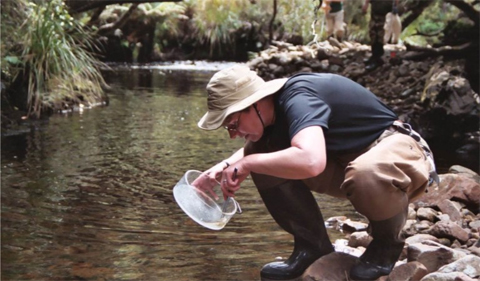
Dr. Morgan Vis Vis examines a freshwater red algae find.
Dr. Morgan Vis, Professor and Chair of Environmental & Plant Biology, received an NSF Opportunities for Promoting Understanding through Synthesis (OPUS) award of $136,617 for her research on “OPUS: Synthesizing systematic research of freshwater red algae.”
Vis has been researching the systematics, biogeography and ecology of these algae for more than 20 years. A major part of the project will be a book she is planning to co-author with her collaborator Dr. Orlando Necchi of UNESP, São José Rio Preto campus in Brazil. The book will be comprehensive providing identification keys, photographs and distribution data for all freshwater algae worldwide.
“This project has been a long term goal for both Orlando and myself. I feel very lucky to have the opportunity with this grant to see this through,” said Vis, who will involve undergraduate students in her two-year project.
Abstract: Freshwater red algae are an ecologically important group of organisms with a worldwide distribution from polar to tropical regions, and occurrence in habitats ranging from moist soils and hot springs to streams and lakes. Most species occur in streams where they provide both an important source of food and shelter for macroinvertebrates and fish. Despite their ecological importance, information on their evolutionary relationships and taxonomy is broadly scattered and often difficult to interpret. This project will compile systematics and taxonomic research on freshwater red algae over the past 25 years, in addition to recent distribution and habitat data, to produce a comprehensive synthesis of the group. The culmination of this two-year award will be a book that includes taxonomic keys, photographs and distribution maps that will be accessible to a wide audience. Along with the book, publicly available web-based resources will be updated with distributional, environmental and genetic information so that the data will be widely available for reuse. Two undergraduate students will be trained through individualized research projects that will provide them with valuable skills in algal identification, databasing, and image processing as well as molecular biology techniques and data analysis.
Freshwater red algae are phylogenetically and morphologically diverse, ranging from single cells to complex multicellular tissue-like thalli. In recent years, there has been an extensive amount of data generated on the systematics and phylogeny of these organisms resulting in significant taxonomic changes with the proposed new classes, orders, families, genera and species in peer-reviewed publications. A comprehensive book will provide up-to-date taxonomy, identification keys, and photographs of salient features as well as ecology and distribution data. With the clarification of the systematics, biogeographic trends can be assessed more succinctly for genera and species. Compiling physical and chemical data from habitats within a single location will facilitate understanding of taxon distributions, ecological niche space, and potential range changes in the past and into the future. In addition, online publically accessible resources will be populated with distributional, environmental and genetic data to provide the research community with a reliable data repository for meta-analyses.


















Comments